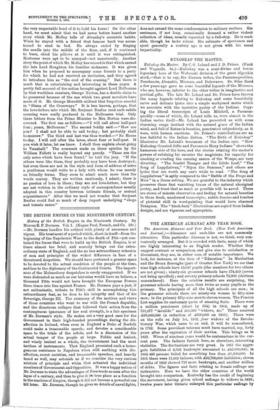THE BRITISH EMPIRE IN THE NINETEENTH CENTURY.
History of the British Empire in the Nineteenth Century. By Marcus R. P. Dorman. Vol. I. (Kegan Paul, Trench, and Co. 12s.) —Mr. Dorman handles his subject with plenty of assurance and vigour. His treatment of a period which, short in itself—from the beginning of the Napoleonic Wars to the death of Pitt—yet con- tained the forces that were to build up the British Empire, is at times almost too brief, and scarcely brings out the extra- ordinary state of England, and the no less extraordinary cohesion of men and principles of the widest difference in face of a threatened despotism. We should have preferred a greater space to be devoted to the actual condition of the people at the time, and less to the diplomacy of the Continental Courts. The import- ance of the Malmesbury despatches is surely exaggerated. If we were distrusted as much as our historian would have us believe, a thousand Pitts would not have brought the European Powers three times into line against France. Mr. Dorman pays a just, if not enthusiastic, tribute to Pitt's skill in accomplishing this extraordinary feat, as he does to his integrity and that of his Sovereign, George III. The summary of the motives and views of those countries who went to war with the French Republic, and the disastrous collapse that followed their action from the contemptuous ignorance of her real strength, is a fair specimen of Mr. Dorman's style. He makes out a very good case for the Government in their high-handed proceedings during the dis- affection in Ireland, when even in England a Duke of Norfolk could make a treasonable speech ; and devotes a considerable space to the trials of the rebels, and to a discussion of the actual temper of the people at large. Politic and lenient, and wisely lenient as a whole, the Government had the most tactless of instruments. That England presented such a homo- geneous resistance to Napoleon when still seething with dis- affection, secret societies, and treasonable speeches, and heavily taxed as well, may astonish us if we consider the very curious mixture of principle and whim that actuated the individual Dorman to state the advantages of Free-trade as seen after the members of Government and Opposition. It was a happy notion of does not extend the same condescension to military matters. His sentences, if not long, occasionally demand a rather violent collection of ideas, usually separated by a full-stop. He is read- able, though he lacks colour. His estimate of sportsmen and sport generally a century ago is not given with his usual impartiality.


























































 Previous page
Previous page